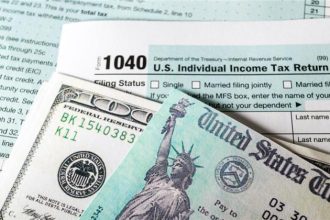Credit Sesame discusses the Consumer Expectations Index and economic pessimism in mid-2024.
The latest consumer confidence figures show that Americans are more pessimistic about the economy. The Consumer Confidence Index, issued by the Conference Board, is considered a key indicator of economic health. This index declined in June 2024 and has been trending downward since late 2021. This pessimism may be a product of the cumulative strain of inflation and rising debt burdens. In other words, consumer confidence may reflect some real problems facing the economy. This rising pessimism may be realistic and healthy in the long run.
The risk of the self-fulfilling economic prophecy
The Consumer Confidence Index is considered a leading indicator, meaning it predicts what’s to come. In current circumstances, the pessimism may predict a future downturn in the economy. The portion of the index that measures expectations for the months ahead is used to gauge where the economy is heading.
The Consumer Confidence Index has two parts: the Present Situation Index and the Expectations Index. As the names suggest, the Present Situation Index deals with current conditions while the Expectations Index measures consumer opinion about the economy’s trajectory over the next 6-12 months.
The Present Situation Index rose slightly in June. However, the Expectations Index fell and has been below a level traditionally associated with impending recessions for the past five months.
One reason the Consumer Confidence Index is considered a leading indicator is that consumer attitudes can become a self-fulfilling prophecy. If people think economic trouble is coming, they tend to pull back on spending out of caution. Less consumer spending typically means less economic activity. Thus, the slowdown people feared can become a reality.
How can economic pessimism be healthy?
A decline in the Consumer Confidence Index is cause for concern, but can it be healthy?
Since pandemic restrictions started to ease, consumers have been on a spending binge. They traveled, indulged themselves, and perhaps threw caution to the wind financially.
This is reflected in fast-rising debt levels. Total consumer debt has risen by 20.78% over the past three years. Credit card debt, which is especially expensive, has risen more than twice as fast as debt in general, with a 44.81% increase over those three years.
These ominous trends slowed in the first quarter of 2024. Total debt grew by just over 1%, and credit card debt actually shrunk slightly. If rising economic pessimism causes consumers to stop spending like there’s no tomorrow, it could ease the risk of excessive consumer debt.
Concern about the future may prompt more savings
Another way that economic pessimism could lead consumers toward more responsible personal finance habits might be if they raise their savings rates.
So far in the 21st century, personal savings rates have averaged 5.7%. However, as of the first quarter of 2024, the personal saving rate shrunk to 3.8% and has generally been below 4% since the beginning of 2022.
A little more concern about the future may lead people to spend less and save more. This might be bad for the economy in the short term. However, it would prepare people better for future setbacks and retirement.
The age of pessimism
An interesting feature of the latest consumer confidence report is that the recent rise in economic pessimism about the economy is centered on people aged 35 to 55. Adults younger and older than that age range became more optimistic in June 2024. To some extent, an age-related difference in perspective is understandable.
- Young adults are concerned about student loan debt. However, one of the most negative trends in the economy over the past couple of years has been inflation. When it comes to paying off student loan debt, younger people can actually benefit somewhat from inflation. Inflation is likely to grow their future earnings faster, making their student loan burdens shrink by comparison.
- Middle-aged adults take on the most serious financial burdens. They juggle immediate needs such as buying a home and supporting a family with getting serious about saving for retirement. People between 35 and 55 spend more than any other age group, so they are very sensitive to inflation. Given recent conditions, the pessimism of this age group is understandable.
- Older adults’ rise in optimism is puzzling. According to Credit Sesame’s analysis of figures from the New York Fed, this age group has taken on debt at a faster rate than others over the past three years. Perhaps they could benefit from a little more pessimism.
Regardless of circumstance, a dose of economic pessimism at this time may be healthy for individuals and ultimately, the economy. Americans emerged from the pandemic primed for a spending binge. Now, it’s time to stop living for today and start preparing for the future.
If you enjoyed Is current economic pessimism actually healthy? you may like,
Disclaimer: The article and information provided here are for informational purposes only and are not intended as a substitute for professional advice.
Read the full article here
















